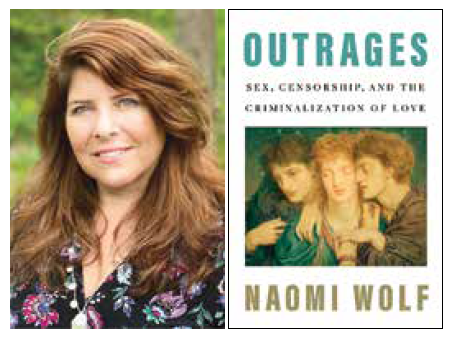
By Michele Karlsberg–
Michele Karlsberg: This month’s column features Dr Naomi Wolf, who has penned an exclusive piece for the San Francisco Bay Times. Naomi is a liberal, progressive feminist author, journalist, and former political advisor to Al Gore and Bill Clinton. Her latest book, Outrages: Sex, Censorship, and the Criminalization of Love, is published by Chelsea Green Publishers.
Dr. Naomi Wolf: Twitter today featured calls to ban the novel To Kill a Mockingbird, because its depiction of racism made students uncomfortable. The Oxford student union, when I was last there, called for Julian Assange to be “de-platformed”—that is, denied a chance to speak—due to accusations against him of sexual misconduct (he had not yet been tried). At Barnard, where I was a Fellow, a student-posted banner showed a map of pre-1948 Palestine; it was removed at the President’s direction when other students complained that it made them—yes—“uncomfortable.”
Calls are rife to close down various commentators for sins ranging from allegedly being mean to staff (talk show hostess Ellen DeGeneres) to inappropriate comments. These calls have a new term: “cancel culture.” Merriam-Webster defines this as withdrawing support for a public figure due to something problematic he or she said or did. https://tinyurl.com/y34xl3qv
I want to warn about “cancel culture,” and draw a bright line distinguishing boycotts from censorship, as the two notions are being dangerously blurred.

I believe in boycotts; I called for them in my 1990s book about feminism, Fire with Fire. Boycotts are great for speech: you call attention to what you oppose—including racist, sexist, homophobic, or transphobic practices—and withdraw consumer support. You meet bad speech with more speech.
What’s happening now goes far past calls to boycott. Today’s “cancel culture” cracks down on speech; or seeks to crush people’s chances to use language. Sadly, this new censorship, dressed in “woke” clothing, is more often levied from the left than from the right (I say that with regret, as a member of the left). Students today on the left often quail at blanket support for the First Amendment when it comes to speech that may be “offensive.”
This is a shameful abdication of the historical role of the left of championing freedoms of speech. It was the left that supported banned books such as D H Lawrence’s Women in Love, and Allen Ginsberg’s homoerotic poem Howl; it has been the right that sought to censor in the name of “family values” or religion. The censor’s traditional political stance is disastrously reversed.
My new book, Outrages: Sex, Censorship, and the Criminalization of Love—which, ironically enough, librarians were asked to destroy last spring—explains how modern censorship was invented. Having documented the history of censorship, I assure you: censorship never works. It’s an atavistic instinct, to deal with speech we don’t like by trying to snuff it out, choke it, murder it. But ideas simply cannot be killed that way.
In the 19th century, the British state, inspired by the French state’s prosecution of Madame Bovary for “offending public mores,” passed the 1857 Obscene Publications Act; ideas that had been salacious, marginal, or challenging could now send the writer, publisher, and bookseller to prison at hard labor.
Who faced legal actions? Algernon Charles Swinburne, the iconic poet; and feminists informing women about contraception, such as Annie Besant. America copied Britain, with the Comstock Act of 1873; legendary poet Walt Whitman was threatened; his print run destroyed.
Censorship never prevailed to kill an idea. Though discussion of same-sex love and sexuality was targeted by Victorian censors in both Britain and the U.S., this did not end homosexuality or lesbianism. Nazis burned “decadent” books; we still read Freud and Jung.
Eight of 10 of the most banned books on the American Library Association’s list show LGBTQ relationships in a positive light to younger readers. That censorship isn’t making any fewer young readers gay, lesbian, or transgender. What is seen as objectionable by the censor changes from generation to generation, leaving tragedy and ruined lives and careers in its wake.
“Sunlight is the best disinfectant,” cliché though it is, is the right approach in dealing with what we see as toxic speech.
We need to insist on free speech when educating young people, and champion its primacy in public debate, as tempting as “cancel culture” is, short-term.
If we don’t, “cancel culture” will, as it always does, eat its young; that is, silencing others always eventually silences everyone.
You simply can’t kill ideas by starving them of listeners. But you can kill democracy.
From “New York Times” bestselling author Naomi Wolf, “Outrages: Sex, Censorship, and the Criminalization of Love” explores the history of state-sponsored censorship and violations of personal freedoms through the inspiring, forgotten history of one writer’s refusal to stay silenced. Newly updated, the work represents the first North American edition—a paperback original. https://www.chelseagreen.com/
Michele Karlsberg Marketing and Management specializes in publicity for the LGBTQ+ community. This year, Karlsberg celebrates 32 years of successful book campaigns. For more information: https://www.michelekarlsberg.com
December 3, 2020
Recent Comments